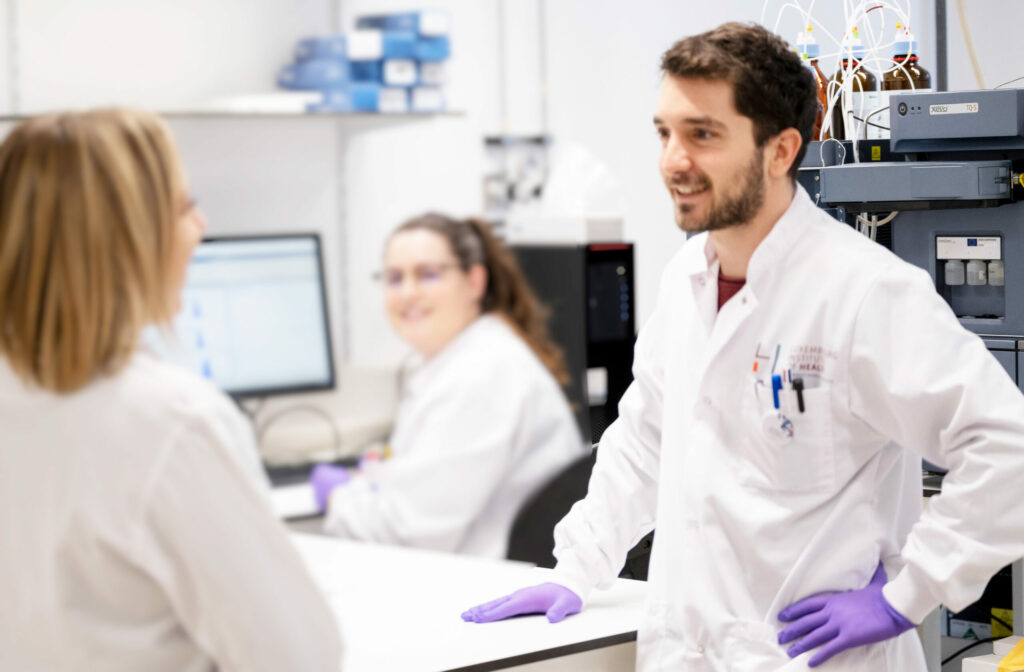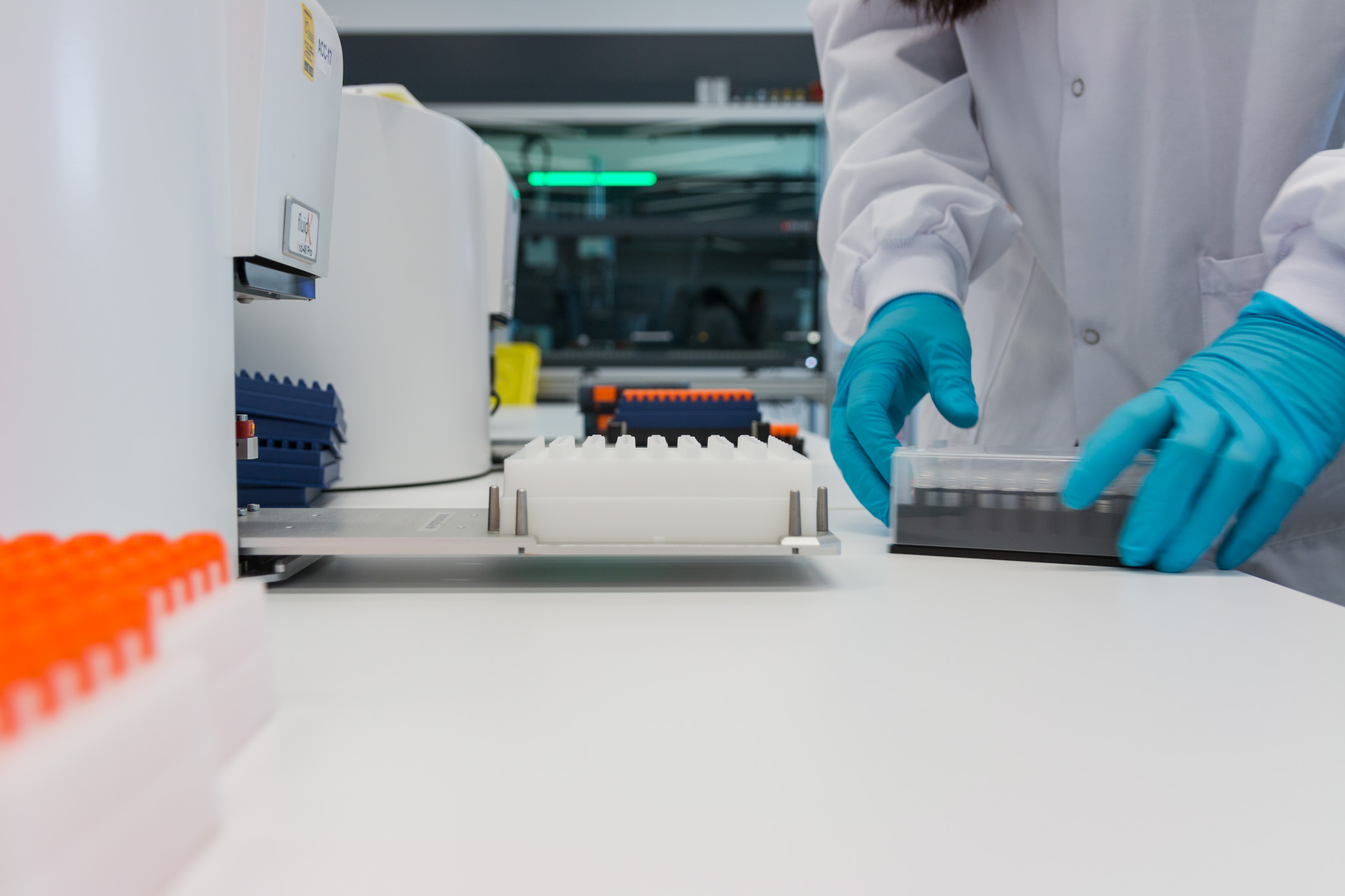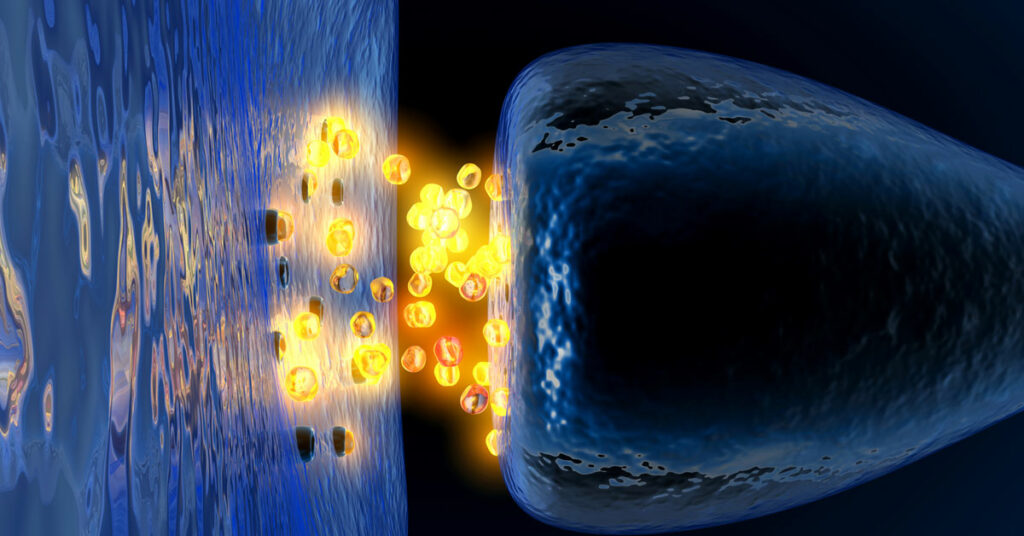
neuro-immunology group
The Neuro-Immunology Group seeks to elucidate the complex interactions between the nervous and immune systems under tumorigenic, inflammatory or neurodegenerative conditions to identify targets to modulate neuroinflammation for specific neurological diseases.
ACTIVITIES
Inappropriate CNS immune cell reactions often underpin neurological illnesses. Thus, their underlying cellular and molecular mechanisms have emerged as a potential therapeutic target. The Neuro-Immunology Group aims to identify the immunological properties of CNS immune cells, with microglia representing the key effector cells, as well as to investigate their crosstalk with peripheral immune cells under tumorigenic, inflammatory and neurodegenerative conditions in order to identify specific programs which could represent targets for therapeutic intervention.
The group consistently achieves these goals through three steps:
1. Characterise cells at the -omics level, for instance elucidating their epigenetic, transcriptional and metabolic signatures;
2. Identify genes and pathways that are perturbed under disease conditions and compare them to homeostatic states;
3. Investigate how manipulating the identified pathways affects the acquired phenotype and eventually the disease outcome.
To reach these objectives, the group takes advantage of valuable biological samples from patients and specific mouse models for human brain tumours and neurodegenerative diseases as well as in vitro eukaryotic cell cultures. They combine -omics analyses with specific molecular biology tools and cutting-edge biochemical assays. Additionally, they work in close collaboration with bioinformaticians and computational biologists to infer the underlying networks as well as to integrate their data with existing information gathered through literature review.
On top of this systems approach, much of their attention is focused on IRG1/ACOD1, a key immune response gene expressed by myeloid cells under inflammatory, tumorigenic and neurodegenerative conditions. They have previously elucidated the function of IRG1/ACOD1 protein by demonstrating that it links metabolism to immunity by catalysing the production of the anti-microbial/anti-inflammatory metabolite itaconate from cis-aconitate in the tricarboxylic acid (TCA) cycle. Notably, their discovery contributed to pave the way to the emerging field of immunometabolism, which is currently revealing the crucial role of metabolic reprogramming in immune responses.
A better understanding of the cellular and molecular mechanisms underlying the immunological properties of CNS immune cells and the subsequent ability to manipulate them, such as render them anti-tumorigenic or neuroprotective, will pave the way to novel therapeutic applications tailored to specific neurological diseases with an immunological component.

Michelucci
Partners & Funding
Projects & clinical trials
Some of the group’s research projects include:
- Explore the local and systemic heterogeneity of myeloid cells for precision immunotherapy in glioblastoma
- Identify and harness targets to revert glioblastoma-associated immunosuppression via functional modulation of myeloid cells
- Analyse microglial responses and heterogeneity under inflammatory conditions and in Parkinson’s disease
Featured team members
Scientific publications
-
Protocol for the generation and assessment of functional macrophages from mouse bone marrow cells – 20/03/2025
Alessandro Michelucci and 2 other authors -
Adenoviral delivery of the CIITA transgene induces T-cell-mediated killing in glioblastoma organoids – 13/11/2024
Simone Niclou and 13 other authors -
Protocol for immunofluorescence staining and large-scale analysis to quantify microglial cell morphology at single-cell resolution in mice – 04/12/2024
Alessandro Michelucci and 3 other authors -
AllergoOnkologie – 01/12/2024
Sophia N. Karagiannis and 30 other authors -
Multiomics approaches disclose very-early molecular and cellular switches during insect-venom allergen-specific immunotherapy – 26/11/2024
Markus Ollert and 41 other authors -
Metformin impacts the differentiation of mouse bone marrow cells into macrophages affecting tumour immunity – 30/09/2024
Alessandro Michelucci and 15 other authors -
Granulocytes and mast cells in AllergoOncology—Bridging allergy to cancer – 22/07/2024
Mariona Pascal and 18 other authors -
PARK7/DJ-1 deficiency impairs microglial activation in response to LPS-induced inflammation – 16/07/2024
Alessandro Michelucci and 20 other authors -
AllergoOncology – 01/01/2024
Aurélie Poli and 29 other authors -
Glioblastoma-instructed microglia transition to heterogeneous phenotypic states with phagocytic and dendritic cell-like features in patient tumors and patient-derived orthotopic xenografts – 02/04/2024
Anna Golebiewska and 24 other authors -
Targeting the ACOD1-itaconate axis stabilizes atherosclerotic plaques – 01/04/2024
Menno PJ de Winther and 20 other authors -
Multiomics approaches disclose very-early molecular and cellular switches during insect-venom allergen-specific immunotherapy – 22/02/2024
Feng Q Hefeng and 38 other authors -
PARK7/DJ-1 deficiency impairs microglial activation in response to LPS-induced inflammation – 09/02/2024
Alessandro Michelucci and 17 other authors -
Glioblastoma-instructed microglia transit to heterogeneous phenotypic states with phagocytic and dendritic cell-like features in patient tumors and patient-derived orthotopic xenografts – 12/12/2023
Anna Golebiewska and 21 other authors -
SUSD2-IL-2 receptor interaction hinders antitumoral CD8+ T-cell activity – 01/01/2023
Ilaria Salvato and 2 other authors -
A SPECT-based method for dynamic imaging of the glymphatic system in rats – 21/02/2023
Maiken Nedergaard and 12 other authors -
PARK7/DJ-1 in microglia – 18/04/2023
Alessandro Michelucci and 3 other authors -
Transcriptional and Chromatin Accessibility Profiling of Neural Stem Cells Differentiating into Astrocytes Reveal Dynamic Signatures Affected under Inflammatory Conditions – 21/03/2023
Alessandro Michelucci and 8 other authors -
Allergic airway inflammation delays glioblastoma progression and reinvigorates systemic and local immunity in mice – 01/01/2022
Aurélie Poli and 16 other authors -
Correction – 29/11/2022
Aaqib Sohail and 20 other authors -
SPECT/CT imaging reveals CNS-wide modulation of glymphatic cerebrospinal fluid flow by systemic hypertonic saline – 21/10/2022
Maiken Nedergaard and 9 other authors -
Adenovirus-mediated delivery of the MHC-II Transactivator CIITA gene induces tumor cell killing in immunocompetent glioblastoma organoids – 05/09/2022
Ilaria Salvato and 9 other authors -
Glioblastoma-instructed microglia transit to heterogeneous phenotypic states with dendritic cell-like features in patient tumors and patient-derived orthotopic xenografts – 05/09/2022
Yahaya Abubakar Yabo and 8 other authors -
Modeling immunocompetent tumor microenvironment in glioblastoma patient-derived orthotopic xenografts – 05/09/2022
Pilar Maria Moreno Sanchez and 8 other authors -
AllergoOncology – 01/01/2022
Sophia N. Karagiannis and 30 other authors -
Elucidating tumour-associated microglia/macrophage diversity along glioblastoma progression and under ACOD1 deficiency – 01/01/2022
Alessandro Michelucci and 13 other authors -
Citraconate inhibits ACOD1 (IRG1) catalysis, reduces interferon responses and oxidative stress, and modulates inflammation and cell metabolism – 01/05/2022
Frank Pessler and 20 other authors -
Neurodegeneration and neuroinflammation are linked, but independent of alpha-synuclein inclusions, in a seeding/spreading mouse model of Parkinson’s disease – 29/01/2022
Manuel Buttini and 24 other authors -
Itaconate and derivatives reduce interferon responses and inflammation in influenza A virus infection – 13/01/2022
Frank Pessler and 20 other authors -
Special issue “microglia heterogeneity and its relevance for translational research” – 16/11/2021
Alessandro Michelucci and 2 other authors -
IL-33-induced metabolic reprogramming controls the differentiation of alternatively activated macrophages and the resolution of inflammation – 09/11/2021
Gerhard Krönke and 25 other authors -
Quantitative trait locus mapping identifies a locus linked to striatal dopamine and points to collagen IV alpha-6 chain as a novel regulator of striatal axonal branching in mice – 01/01/2021
Manuel Buttini and 17 other authors -
Allergic airway inflammation impacts tumor take and delays experimental glioblastoma progression – 01/09/2021
Aurélie Poli and 13 other authors - Tumour-associated microglia/macrophage (TAM) heterogeneity in Glioblastoma – 22/06/2021
-
Protocol for derivation of organoids and patient-derived orthotopic xenografts from glioma patient tumors – 18/06/2021
Anaïs Oudin and 16 other authors -
FAM13A regulates KLRG1 expression and interferon gamma production of natural killer cells – 18/05/2021
Ni Zeng and 14 other authors -
Sustained high expression of multiple APOBEC3 cytidine deaminases in systemic lupus erythematosus – 12/04/2021
Danielle PerezBercoff and 13 other authors -
NF-kappa B and TNF Affect the Astrocytic Differentiation from Neural Stem Cells – 08/04/2021
Cindy Birck and 5 other authors -
Microglia in Health and Disease – 31/03/2021
Alessandro Michelucci and 3 other authors -
Single-cell transcriptomics and In situ morphological analyses reveal microglia heterogeneity across the nigrostriatal pathway – 29/03/2021
Alessandro Michelucci and 8 other authors -
CpG Adjuvant in Allergen-Specific Immunotherapy – 23/02/2021
Markus Ollert and 3 other authors -
Patient-derived organoids and orthotopic xenografts of primary and recurrent gliomas represent relevant patient avatars for precision oncology – 01/12/2020
Simone Niclou and 40 other authors -
Interrogating intratumoral transcriptomic heterogeneity and plasticity as resistance mechanisms in glioblastoma – 01/11/2020
Yahaya Abubakar Yabo and 8 other authors -
Pituitary Tumor Transforming Gene 1 Orchestrates Gene Regulatory Variation in Mouse Ventral Midbrain During Aging – 23/09/2020
Lasse Sinkkonen and 16 other authors -
Revealing and harnessing tumour-associated microglia/macrophage heterogeneity in glioblastoma – 01/02/2020
Alessandro Michelucci and 1 other author -
BCL2L15 (BCL2-like 15) – 01/01/2020
Pinelopi I. Artemaki and 2 other authors -
Stem cell-associated heterogeneity in Glioblastoma results from intrinsic tumor plasticity shaped by the microenvironment – 01/12/2019
Simone Niclou and 21 other authors -
Allergooncology: Delayed glioblastoma progression in a mouse model of allergic airway inflammation – 01/08/2019
Aurélie Poli and 13 other authors -
Region-specific microglial heterogeneity and its potential relevance for Parkinson’s disease – 01/07/2019
Oihane Uriarte Huarte and 8 other authors -
Transcriptional and epigenetic mechanisms underlying astrocyte identity – 01/03/2019
Alessandro Michelucci and 4 other authors -
Single-cell transcriptomics reveals distinct inflammation-induced microglia signatures – 01/11/2018
Alessandro Michelucci and 11 other authors -
Microglia in health and disease: A unique immune cell population – 01/09/2018
Alessandro Michelucci and 2 other authors -
Single-cell transcriptomic analysis of microglia/macrophages in glioblastoma – 01/09/2018
Alessandro Michelucci and 6 other authors -
Microglia in health and disease – 15/08/2018
Alessandro Michelucci and 2 other authors -
Delayed glioblastoma progression by repeated nasal instillations of house dust mite extract in a mouse model – 01/08/2018
Aurélie Poli and 11 other authors -
Human leukocyte antigen class I deficiencies – 01/06/2017
Jacques Zimmer and 2 other authors -
Human CD56bright NK cells – 01/04/2016
Jacques Zimmer and 6 other authors -
Dynamic contrast enhanced MRI detects early response to adoptive NK cellular immunotherapy targeting the NG2 proteoglycan in a rat model of glioblastoma – 30/09/2014
Cecilie Brekke Rygh and 11 other authors -
Combining NK cells and mAb9.2.27 to combat NG2-dependent and anti-inflammatory signals in glioblastoma – 01/01/2014
Martha Chekenya Enger and 5 other authors -
TAP deficiency is also a cause of bronchiectasis – 01/05/2013
Jacques Zimmer and 4 other authors -
Elevated CD3+ and CD8+ tumor-infiltrating immune cells correlate with prolonged survival in glioblastoma patients despite integrated immunosuppressive mechanisms in the tumor microenvironment and at the systemic level – 01/01/2013
Martha Chekenya Enger and 7 other authors -
Mouse Lung and Spleen Natural Killer Cells Have Phenotypic and Functional Differences, in Part Influenced by Macrophages – 05/12/2012
Tatiana Michel and 7 other authors -
Expression of the progenitor marker NG2/CSPG4 predicts poor survival and resistance to ionising radiation in glioblastoma – 01/10/2011
Martha Chekenya Enger and 21 other authors -
Increased Th2 cytokine secretion, eosinophilic airway inflammation, and airway hyperresponsiveness in neurturin-deficient mice – 01/06/2011
Tatiana Michel and 7 other authors -
Novel method for isolating untouched rat natural killer cells with higher purity compared with positive selection and fluorescence-activated cell sorting – 01/11/2010
Aurélie Poli and 6 other authors -
NK cells and allergy – 01/01/2010
Tatiana Michel and 4 other authors -
CD56bright natural killer (NK) cells – 01/04/2009
Jacques Zimmer and 5 other authors -
A novel eGFP-expressing immunodeficient mouse model to study tumor-host interactions – 01/09/2008
Simone Niclou and 10 other authors -
Control of NK cell functions by CD4+CD25+ regulatory T cells – 01/01/2007
Jacques Zimmer and 6 other authors -
Reduced cytokine-mediated up-regulation of HLA-DR in TAP-deficient fibroblasts – 15/11/2006
Jacques Zimmer and 5 other authors
Related News

Job vacancies
There are no jobs matching this page at the moment. You can view all jobs via the button below.





















































